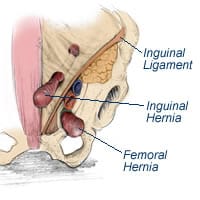A hernia is any type of abnormal protrusion of part of an organ or tissue through the structures that normally contain it. A weak spot or opening in a body wall allows part of the organ or tissue to bulge through. Hernias  may develop in almost any area of the body, but they most frequently occur in the abdomen or groin. Hernias are commonly called “ruptures,” but this is a misnomer, as nothing is torn or ruptured. Hernias can be present from birth (congenital) or can be caused by stress and/or strain.
may develop in almost any area of the body, but they most frequently occur in the abdomen or groin. Hernias are commonly called “ruptures,” but this is a misnomer, as nothing is torn or ruptured. Hernias can be present from birth (congenital) or can be caused by stress and/or strain.
A femoral hernia is just one of many different types of hernias. They occur when a part of the intestine protrudes into the femoral canal. The femoral canal is the tubular passageway that carries blood vessels and nerves from the abdomen into the thigh. Femoral hernias occurs most commonly in women. This condition can be brought about by an inherent weakness in the abdominal muscles in the groin. A sudden or prolonged increase in pressure to this region, as occurs in heavy lifting or coughing, can cause the intestine to be forced through the weakened opening.
Diagnosis of a hernia is usually done by a visual examination and by studying the patients medical history. Sometimes the hernia will be pinched, or strangulated, resulting in pain and nausea. Other times it may hardly be noticeable. Treatment usually involves manually manipulating the protruding portion of the intestine back to the proper place or the surgical repair of the muscle wall through which the hernia protrudes. Surgical repair of a hernia is referred to as a herniorrhaphy. The only effective way of preventing a hernia is to refrain from putting strain or pressure on the area of the abdomen or groin.
